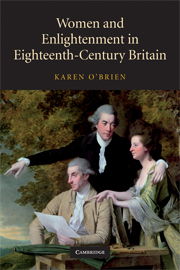Book contents
- Frontmatter
- Contents
- Acknowledgements
- Introduction: the progress of society
- 1 Anglican Whig feminism in England, 1690–1760: self-love, reason and social benevolence
- 2 From savage to Scotswoman: the history of femininity
- 3 Roman, Gothic and medieval women: the historicisation of womanhood, 1750–c.1804
- 4 Catharine Macaulay's histories of England: liberty, civilisation and the female historian
- 5 Good manners and partial civilisation in the writings of Mary Wollstonecraft
- 6 The history women and the population men, 1760–1830
- Notes
- Bibliography
- Index
1 - Anglican Whig feminism in England, 1690–1760: self-love, reason and social benevolence
Published online by Cambridge University Press: 04 September 2009
- Frontmatter
- Contents
- Acknowledgements
- Introduction: the progress of society
- 1 Anglican Whig feminism in England, 1690–1760: self-love, reason and social benevolence
- 2 From savage to Scotswoman: the history of femininity
- 3 Roman, Gothic and medieval women: the historicisation of womanhood, 1750–c.1804
- 4 Catharine Macaulay's histories of England: liberty, civilisation and the female historian
- 5 Good manners and partial civilisation in the writings of Mary Wollstonecraft
- 6 The history women and the population men, 1760–1830
- Notes
- Bibliography
- Index
Summary
In this chapter, I will look back to the late seventeenth century, and forward to the mid eighteenth in order recover the broader philosophical and theological contexts within which debates about women's place in the social order were conducted. Locke's idea of the social contract had its foundations in a materialist epistemology, given its fullest treatment in his Essay Concerning Human Understanding (1690), and in his views on ethics – a subject never addressed fully or separately by him, but in part retrievable from his writings. It was in these broader fields of epistemology and ethics that women writers, including Mary Astell, made their most significant interventions. They ensured, by their example as female commentators on philosophical and religious matters, and, still more, by arguments directly relevant to women, that they had some voice in the profound philosophical reshaping of epistemology and ethics which took place in the wake of Locke's work. Women writers engaged intensely, often critically, with the theological implications of Locke's philosophy, and with the critical response to his work that came from theologians of the Cambridge Platonist school and from Shaftesbury. As we will see in this chapter, a number of women writers – including Damaris Masham, Catharine Cockburn, Elizabeth Burnet, Elizabeth Carter and Catharine Talbot, sought to synthesise, from the raw materials of these philosophical debates, ideas of ethics and epistemology hospitable to the rational and moral agency of women.
- Type
- Chapter
- Information
- Women and Enlightenment in Eighteenth-Century Britain , pp. 35 - 67Publisher: Cambridge University PressPrint publication year: 2009



